Growing up betwixt the auld triangulation points of Irish rebel songs, the rutted boreens of Tipperary and the din of London, Shane Patrick Lysaght MacGowan always seemed bound for some kind of ragged glory.
A gifted songwriter, a truly unique singer and a soulful chronicler of Ireland and the Irish, Shane was many things to many people. Maybe we had been expecting it these many years, but his death so soon after the passing of Irish music greats Sinéad O'Connor and Christie Dignam still comes as a sobering shock.
There goes some kind of Holy Trinity of Irish music. And as Shane would often remark in his Muttley wheeze of a laugh, "I was given six weeks to live, about 25 years ago!"
He had spent the past few months in hospital with a variety of illnesses and not been active in quite a while, but his spirit always seemed present, not least right now in the run-up to Christmas when Fairytale of New York by his band The Pogues drifted out from every speaker in every shop and every pub from New Ross to New York.
And who among us ever got bored with it? After all, Shane MacGowan was never just for Christmas.
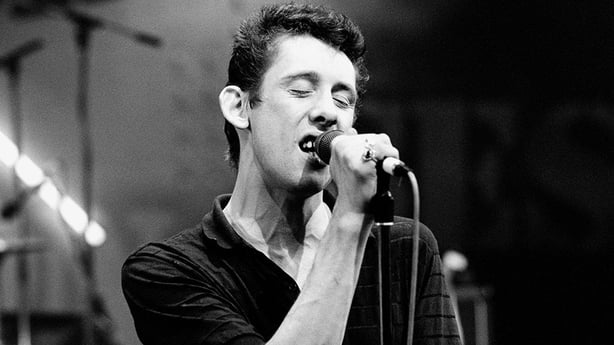
A poet of Paddyism, in his prime he was a dangerous writer of the political and the profane who brilliantly subverted the cliché of the drunken Irish. Perhaps no other Irish songwriter captured the unvarnished reality of the Irish emigrant experience as well as Shane MacGowan.
And of course, his own life wasn’t quite a fairytale.
Born in Tunbridge Wells, Kent on Christmas Day 1957, he was raised by his bohemian parents, Therese, a singer, traditional Irish dancer, and model, and Maurice, who worked in the offices of department store C&A in London and who described himself; as a "local roustabout". There was also an extended family of eccentric aunts and uncles.
Watch: Shane MacGowan sings The Irish Rover with The Dubliners
Shane grew up between the greyness of London and bright summers in Tipperary. The tales were tall, My Fight for Irish Freedom by Dan Breen was the Bible, Radio na Gaeltachta crackled on the wireless, and the porter flowed. Later, there were indeed streams of whiskey. Shane was drinking and smoking at a hair-raisingly tender age. It was perhaps to be the only constant in his life.
In his poignant portrait of the Tipp lad who became a punk poet, provocateur, and prodigious drinker, Crock of Gold: A Few Rounds With Shane McGowan, punk’s Boswell Julien Temple presented a mischievous, Disneyfied view of the disappearing Ireland Shane grew up in. Shane was never afraid of impish mythmaking but in truth, his childhood may have been more prosaic than all that.
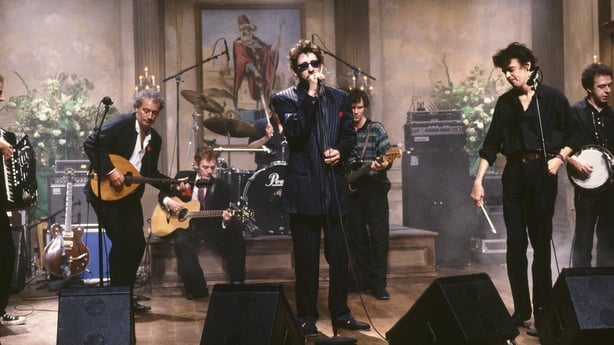
But it was London that made him. When he was 13, Shane, his younger sister Siobhan, and their parents moved back to London and ended up billeted in the grim artifice of the Barbican Centre on the banks of the Thames. It was as far away from rural Tipp as possible.
The highly intelligent and gifted Shane won a literary scholarship to the Westminster School, where he soon befriended the school bully. Later there was work on building sites, and a nocturnal life of uppers and downers on the streets of Soho, commemorated in perhaps The Pogues’ greatest song, The Old Main Drag.
Watch: Shane MacGowan sings On Raglan Road with Imelda May and Finbar Furey
Years later, he told The Guardian that his first spell in rehab came at just 17. He had become rather too fond of valium and checked into the notorious Bethlem hospital in London. It was the kind of Behanesque/Dickensian scene that seems all too Shane.
"I've been lucky," he said. "The first band I saw when I walked out of the madhouse was the Sex Pistols."
There were to be more stints in rehab before he staggered into the welcoming arms of punk, and it only seemed natural that a clever iconoclast like MacGowan would latch onto the scene and form his own band. In fact, back in ’76, even before he had even attacked a microphone, he became a pin-up boy for the punk press - sprawled on the floor in music venues, a jagged grin plastered across his face.
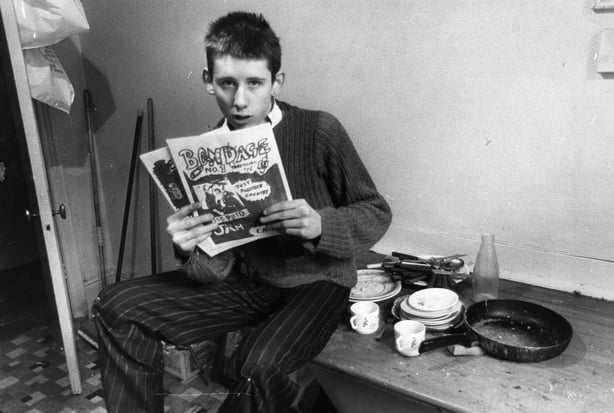
His first band, The Nipple Erectors, in which he was known as Shane O’Hooligan, performed their first gig at The Roxy Club in Covent Garden in 1977. Inspired by The Stooges, they played a rockabilly and sixties garage rock racket and released four singles and one bootleg live album between 1978 and 1981.
But the doodlebug of punk itself was never going to be enough to contain the bloodshot visions of this wild colonial boy. At its most potent and wild, Irish trad and folk certainly shared a kinship with punk so it made perfect sense that Shane and his fellow brigands formed Pogue Mahone and later The Pogues. They would alchemise the spirit of the Sex Pistols, the street politics of The Clash, and the hooley madness of The Dubliners, bottle it, and then spray it back into our faces.
They were wildly successful, The Pogues were Celtic punk soul brothers who took an audacious shot across the bows of the eighties with their songs of "fighting, drinking, dying, living", with Shane’s inspired lyrics about his homeland and the joy and sadness of the Irish emigrant experience.
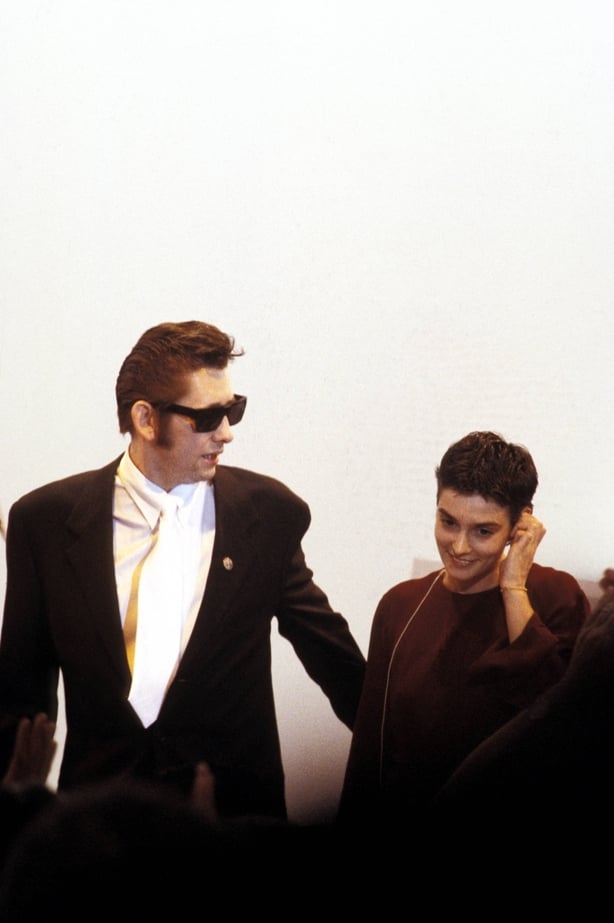
At a time when thousands of Irish were sailing either west or east, clutching their visa lottery tickets to a new life, Shane, cast adrift from his childhood in Ireland, embraced Irish culture and history at a time of mass unemployment and terrorism at home.
On the five albums he recorded with the band, Red Roses for Me (1984), Rum Sodomy & the Lash (1985), If I Should Fall from Grace with God (1988), Peace and Love (1989) and Hell's Ditch (1990), his genius as a writer of gutter poetry and heartbreaking love songs took full flight.
This all happened at the height of a new wave of Paddy-bashing in England as the IRA took its campaign to "the mainland". It made the band’s success all the more potent and meaningful for the Irish abroad, most of whom were sickened by the acts carried out in their name.
Then again, Shane, an Irish émigré forever in shamrock-tinted shades, never made any secret of his Irish Republicanism and his fury at English miscarriages of justice against the Irish, as on his and Terry Woods’ song Streets of Sorrow/Birmingham Six in 1988. It was promptly "banned" by the BBC when it was released.
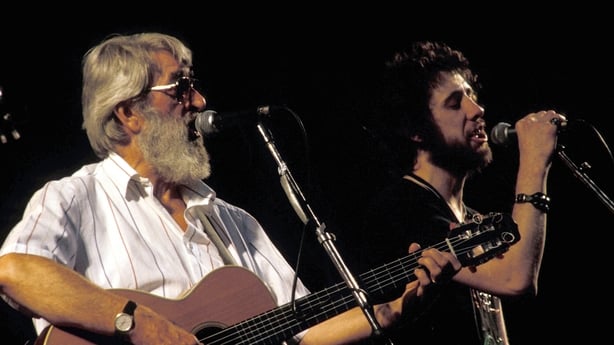
He was friendly with Gerry Adams and in Julien Temple’s film Shane said he was ashamed that he never joined the IRA and "laid down my life for Ireland". He also said that he saw his work with The Pogues as his contribution to our Great Patriotic Struggle.
Whether it was the breakneck banjo gallop of Transmetropolitan, or the way Shane wrung punk pathos out of Dick Shannon’s The Auld Triangle, a song Brendan Behan had made famous some thirty years previously, or the sparkling sophistication of Summer in Siam, The Pogues were never less than brilliant.
But it’s A Pair of Brown Eyes, The Old Main Drag and Thousands Are Sailing (written by fellow Pogue and ex-Radiator From Space Philip Chevron) that will still knock you off your bar stool. It may be no exaggeration to say that The Pogues did for Irish folk and trad what Riverdance did for Irish Dance. They also gave England the greatest education about Irish history it was ever likely to receive.
Of course, the wildness of the band’s live shows was matched only by their love of porter and other stimulants. Shane, the unlikely pop star, was often treated as a curio by the English press and he was often irked and impatient with fame.
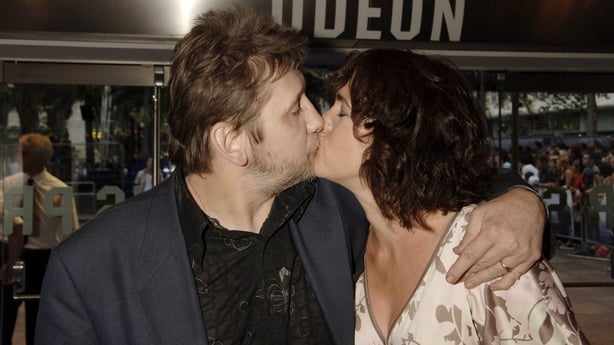
As Julien Temple told RTÉ in 2020: "There was a period when they’d wheel him onto chat shows to watch him fall over or whatever, but he would always have a comeback that was far wittier than the host."
But like so many of his literary heroes, Shane was to sink further into drink and drug use. He hated fame and dealt with it via the oblivion of alcoholic obliteration. However, he kicked against the pricks and the drunken Irish cliche. "It's a story," he said. "Every time I pick up a drink there's a photographer and it becomes, 'Oh look, Shane's pissed again.'
And like pretty much all bands ever, he and the rest of The Pogues fell out seemingly for good when, blitzed on sake, he fell out of their tour bus on a Japanese tour in 1991. Later he would recall that he was "glad to get out alive" and that he was under increasingly pressure to live up to his reputation as "a songwriting legend".
After his departure, The Pogues were inevitably a lesser affair. I recall seeing Joe Stummer of The Clash make his live debut as the new singer with the band in 1991, suitably enough in the National Stadium in Dublin, the world’s first purpose-built boxing arena. When Strummer stepped up to the mic, a near riot broke out such was the audience’s loyalty to their missing hero.
All bleary eyes remained on Shane and what he would do next and when he formed his new band Shane MacGowan and the Popes, the spirit was still kicking. He doubled down on the more cartoonish elements of his Paddy pride. In fact, he once said his ambition was to write an album with the word "Paddy" in every song title.
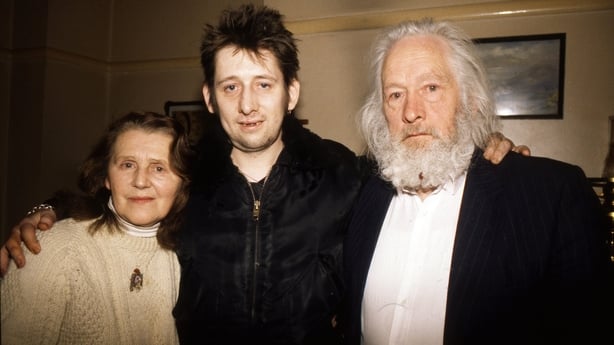
Now severed from The Pogues, Shane set about dismantling the legend that had been built up around him, a legend that he was never comfortable with. In interviews, he refused to let journalists use tape recorders and spent the ordeal of meeting the press as an exercise in mischief-making, a battle of wits that he always won.
There were also collaborations. He reunited with Kirsty MacColl and sang with Strummer, Nick Cave, Steve Earle and Ronnie Drew, and the late Sinéad O'Connor on the spine-tingling duet Haunted.
A short-lived reunion with The Pogues in 2001 certainly drew crowds but by then Shane had become erratic, irascible or simply absent. Performing became more and more difficult and public appearances were less frequent.
Following an accident in 2016, he was largely confined to a wheelchair and often held court like some Celtic buddha with a thousand-yard stare. However, in Temple’s film, he was full of pithy insights, such as "God is Irish" and "I used to get high when I dropped the host at mass".
Back in 2015, his legendary teeth finally got fixed and this "Everest of dentistry" was documented in a Sky Arts documentary called Shane MacGowan: A Wreck Reborn.
MacGowan never bargained on such fame and success. It left him cold. As his novelist sister Siobhan, who he once planted face-first into a cowpat when they were kids in Tipperary, poignantly remarks in The Crock of Gold, "He went away and never came back. Not the Shane I ever knew".
In the final years of his life, he remained much loved and revered. When a slightly belated musical celebration was held in the NCH in Dublin to mark his 60th birthday in 2018, Nick Cave, Johnny Depp, Glen Hansard, Bono, and Sinéad O’Connor all rocked up to pay their respects and touch his hem. On the night, fellow poet President Michael D Higgins presented Shane with a lifetime achievement award.
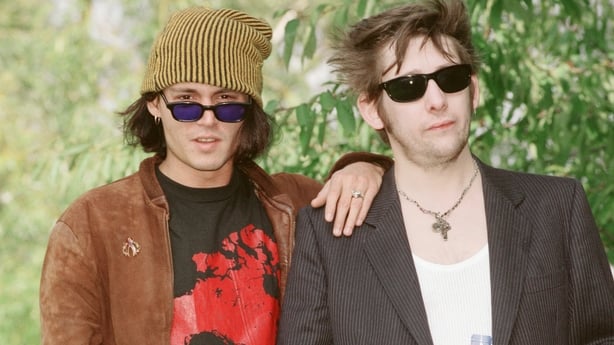
Shane married his long-time partner Victoria Mary Clarke in 2018 and late last year they published The Eternal Buzz and the Crock of Gold, a limited-edition book of his lyrics and drawings.
In his final years, he and Victoria lived in Dublin but over the past few months, Shane had been in and out of hospital. Many well-wishers came to visit, including his former Pogues band mates, members of Clannad, Gerry Adams and Bruce Springsteen on his most recent sojourn in Ireland last May.
In an email to RTÉ, Richard Balls, author of the excellent 2020 book A Furious Devotion: The Authorised Story of Shane MacGowan, wrote, "For most music fans, Shane MacGowan will be forever synonymous with Christmas and New York, thanks to his extraordinary and unorthodox contribution to the festive songbook.
"However, his legacy stands taller than the Empire State and broader than his beloved River Shannon, so momentous was the impact of his writing and the rebel spirit of The Pogues.
"By hotwiring the traditional songs, he had learned as a child with the insurgent energy of punk, MacGowan kicked open the door to Irish music for millions who might never have experienced it, instilled pride among the Irish in Britain at a time when so many felt cowed and made Ireland itself cool."
Now Shane himself is the legacy. There is more than a drop of his brand of the hard stuff in the guttural post-punk of Fontaines D.C., the proud trad of Lankum, The Mary Wallopers, The Scratch and countless other acts, both Irish and global, who were inspired by his genius for words of sadness, rage and love.
At his Dublin show last November, Bob Dylan revealed from the stage that Shane was present, and that Fairytale of New York was a favourite of his, saying: "I listen to it every Christmas". When perhaps the greatest songwriter of all time pays homage, well, you know you are something very, very special.
Dylan, an early fan of the Clancy Brothers, knew a soulmate when he saw one. He knew what kind of coarse but beautiful cloth Shane MacGowan was fashioned from. Maybe the light in his eyes and the song in his heart had diminished over the years, but Shane’s music, which always sounded like it had been around forever anyway, lives on.
Alan Corr @CorrAlan2

